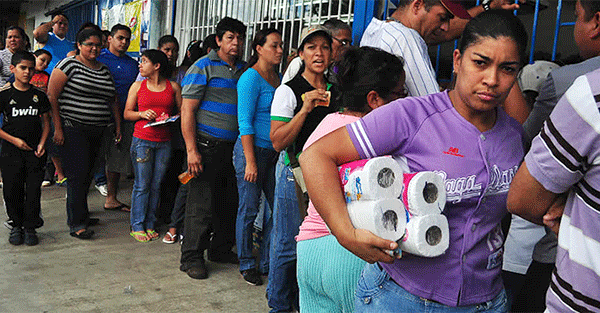By 2014, inflation was at 50% in Venezuela.
Just paying the bill at a restaurant now required a thick stack of cash.
When that happened, some people simply tightened their belts and stopped going out to eat. Others saw this as a warning sign to look for another, more stable country.
Then in 2015, supermarkets started facing shortages.
So in order to get the groceries they needed, people started lining up outside of stores from early in the morning.
Others saw this as another warning sign, and started searching for jobs in other countries.
Now in 2016, those supermarket shelves are completely empty. Inflation is nearly incalculable. And the entire country has descended into crisis.
Regular people have turned to attacking supply trucks, looting stores, and combing through trash dumpsters just to survive.
As things become increasingly desperate, more and more are scrambling for a way out of the country… only to find that it’s too late.
Many countries, including the United States, have started putting up barriers to prevent a massive inflow of Venezuelan economic refugees.
Two years ago it wouldn’t have been much of a problem. Few people were trying to leave back then, so there were plenty of options available.
Today there are tens of thousands of people trying to leave at the same time, making this a full-blown refugee crisis. So naturally the gates have swung shut.
Venezuela is an incredibly important reminder, not only of how impoverishing socialism can be, but also how important it is to have another option.
Part of having a robust Plan B is ensuring that you and your family have the legal right to go, live, work, invest, and do business in a safe, stable foreign country.
It’s an insurance policy that you (hopefully) might never actually have to use.
But if the day ever came when you felt like you needed to leave, whether for financial or personal safety reasons, having clear legal status in a country where you actually like to spend time can make a world of difference, not to mention stability for your family.
It requires very little to establish a foreign residency in many countries other than a bit of advanced planning and perhaps a small investment.
(Which, given how much value and protection an offshore bank can provide you, this is something we definitely recommend considering.)
Depending on where you go, establishing foreign residency could even qualify you for naturalization and a second passport in a few years’ time.
Bottom line– Investing a little bit of time now will provide tremendous insurance against political and economic uncertainty in the future, should it ever occur.
And even if nothing happens, you can still end up with a second passport, something that can provide more business, investment, travel, and lifestyle options to you and your family.
Best of all, the second passport you obtain can even be something that you’re able to pass down to your children and grandchildren, so that future generations can benefit from the small investment you make today.
If only all insurance provided returns like that…








